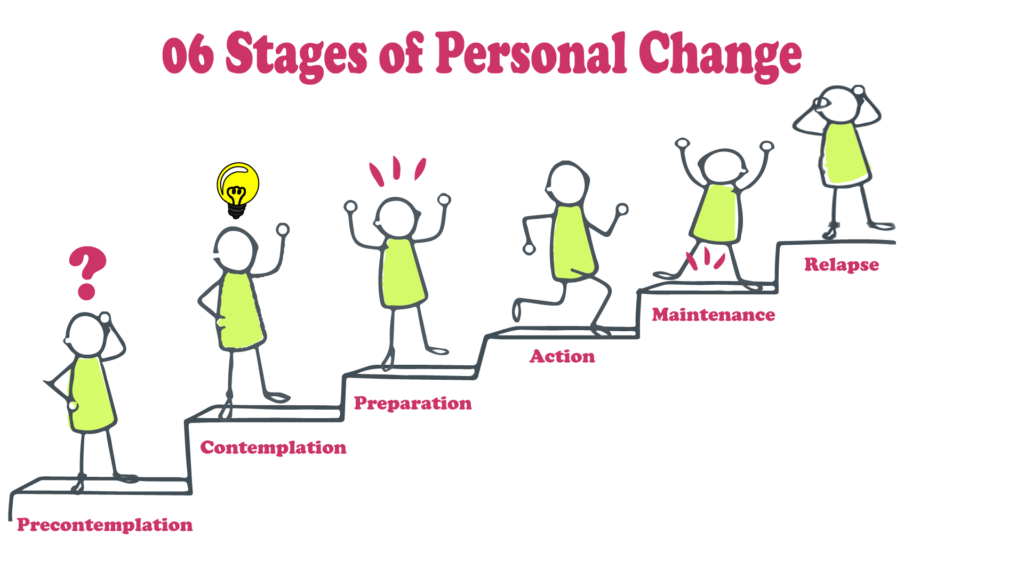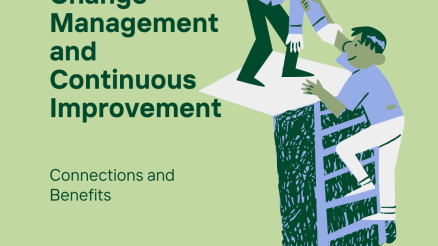How many of us stick to their new year’s resolutions or any commitment to behaviour change? Is change of personal habits, attitude and behaviour is a simple task?
No, it’s not.
Why ?
Because it takes time, energy, commitment and hard work to make a successful behaviour change. And there is no quick-fixed-one-single solution for all of us.
Psychologists and scholars have been continuously studying human behaviour to find out best solution for personal change. There has been a lot of research studies on this and many of theories and models are available to help us.
But one of the best-known models is 06 stages of behaviour change by James Prochaska and Carlo DiClemente. They were actually studying how people quit habit of smoking and what is process of change in human behaviour.
But their model is effective and practical so it can be easily generalized and applied to any situation of personal change.
Let’s check out what are those 06 stages of behaviour change.
1. Pre- Contemplation Stage
The first stage is pre-contemplation when people have no idea about what to change and how to change. This is a stage of denial and people are ignorance about their problems. They have fixed believes and they think they are doing right things in right way.
They do not revisit their thoughts, attitudes and behaviours. They have no understanding that their behaviour and habits are damaging so they are also unaware about consequences of their actions. In this stage people feel low motivation and energy to change their habits. Usually, this is a stage six months to a year before contemplation stage.
2. Contemplation Stage
In this stage, people are exposed to problems of their behaviour and habits. They come to know the consequences of their current behaviour and habits and what will be potential benefits of making a change.
But still people find themselves in a conflicted state of mind. They are not clear on pros and cons of behaviour change. They usually consider that cost of changing their behaviour is greater than potential benefits. They experience strong emotional state of mind and remain indecisive for a long period of time. Due to this kind of self-doubt, contemplation persists for few months, a year or so. Most of the people remain stuck in this stage and never go beyond it.
3. Preparation
In this stage, people want to give a try to new behaviour and habits. They start thinking that benefits of making change outweigh its cost. With this belief, they start by taking baby steps i.e collecting information about change, listing down all the required resources, making plan of action and reaching out to mentors.
This is the stage of first action so they take small actions to experience change. For example, if they want to start daily exercise, they might search membership of a nearby gym or finding friends who they can accompany. So, this is the stage of exploring the ways and means of making change to happen. This is also very important stage because if people make good planning and preparation then they have high chances of getting though their goals.

4. Action
Action is the stage when people take direct action to achieve the desired change. This stage is test of previous stage as well. If preparation and planning work is rightly done then people take firm actions towards their goals and achieve success.
When people take action, they fee highly motivated and their positive energy keep them going. They do not feel stressed out even though they are putting lot of hard-work. At this stage change becomes easy and people tend to embrace change whole heartedly. The research also shows that if people spend more than 21 days in action stage then their chances of success are higher.
5. Maintenance
In this stage, people keep their new behaviour, habits, and actions going for a long period of time. They stay committed and successful in avoiding temptation to resume old behaviour, habits and actions. They become a hard nut to crack and feel motivated by experiencing change and realizing their own potential and strength to make something big happen.
In maintenance stage, people also learn what is best suited strategies for them to cope with temptations of giving up on new habits. For this one of the most common methods is to give yourself award for staying consistence and continuing with change.
People feel abundance of positive energy as long as they are on maintenance stage. It is the longest stage of all, people usually stay from 21 days to few years on this stage until the final goal is successfully achieved.
6. Relapse
During the action and maintenance stage people may give up and resume old habits and behaviours. Relapse is the stage of failure, frustration and setback. The emotional feelings are so strong at this stage that people may affect or damage their mental health.
There is always a trigger which lead people to relapse. Only few has ability to overcome this trigger whereas many of us surrender and throw themselves to old situation. One of effective strategy to cope with this stage it to proactively identify triggers beforehand so that it can be avoided to stay on maintenance stage.
If people fail to resist the trigger and resume old habits then it is recommended to start afresh. The first task is to know where you are on stages of personal change. Since you already know problem of behaviour and habit then you are not on first two stages . It must be third and fourth stage. So, by making good preparation all over again and taking right actions you can move toward stage of maintaining desired change.
The key to success is to assess your behaviour on each stage and recognise where you are on 06 stages of personal change.
Limitations of the 06 Stages of Behaviour Change Model
Though the 06 Stages of Personal Change helps us understand change process and how change can be achieved. Yet there are common four limitations of this model.
- This model does not give importance to assessment of desired new behaviours or your goals. It does not tell whether desired behaviour is realistic or not. It mainly focusses on personal capability to make change and says nothing on desired behaviour itself.
- It is always difficult to objectively assess your progress toward making change in your behaviour. It is human nature to overestimate or underestimate progress on making change in behaviour. Without objective assessment of progress, it is difficult to recognize the stage you are on and how you will proceed further.
- This model does not specify what is exact amount of time required in each stage and how long people remain in one stage and shift to other.
- The core assumption of this model is that people make logical decisions and they move smoothly from one stage to another. But in real life this is not the case. People ability of decision making is complex and it is not that simple.
Take Home Points:
- 06 Stage Personal Change model explains process of change in people’s behaviour
- Precontemplation – they are unaware of problem of their behaviour and habits
- Contemplation – they come to know about problem and consequences of their behaviour and habits
- Preparation – they start preparing to change their behaviour
- Action – they take firm actions to change their behaviour
- Maintenance – they stick to their actions for long period of time
- Relapse – they resume their old behaviours and habits



